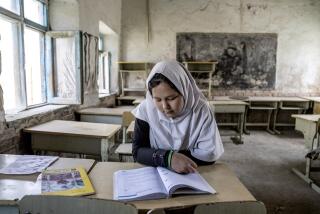‘Rukhnamization’ Gets an I for Incomplete
- Share via
ASHGABAT, Turkmenistan — Murat shows off a few English phrases and proudly recounts attending Soviet-era schools and university, where he earned a degree in history.
But the ethnic Turkmen is dismayed at schools today in this former Soviet republic, where his daughter is in fourth grade. He sums up his feelings tersely: “Bad.”
Educational standards have declined steeply since the Central Asian nation became independent in 1991. Human rights activists say the government has stripped down schooling in what appears to be an attempt to dumb down its people and strengthen President-for-Life Saparmurat Niyazov’s hold.
The trend worries diplomats and others. Turkmenistan -- sitting amid Iran, Afghanistan, Uzbekistan and Kazakhstan -- is in a tense region where repression is fueling the emergence of extremist groups. It also holds energy resources critical to Russia and is important to a U.S.-backed effort to build a trans-Afghan gas pipeline to Pakistan.
Murat, a professional athlete who asked that his last name not be used to avoid retribution, teaches his daughter Russian and English at home, languages he thinks are important for keeping up with the outside world.
At school, meanwhile, his daughter’s work is dominated by “Rukhnama,” the “Book of the Soul,” written by Niyazov, which is held up as a sacred text. Children start their days by studying the text, and Niyazov’s ruminations permeate other subjects.
“The Turkmen education is negligible,” said Erika Dailey, Turkmenistan project director for the New York-based Open Society Institute, which works to build free and open societies. “It exacerbates the isolation that’s been crippling the country.”
The government justifies its education policies as necessary to develop an independent Turkmen identity after decades of Soviet rule. As in other former Soviet republics, authorities have cut Russian-language instruction, and English is increasingly the preferred second language.
Turkmenistan does have 14 Turkish-financed schools and a university that offer good instruction, with a computer in every classroom, and chemistry and physics classes taught in English. But those few bright spots aren’t indicative of the system and they are available only to the privileged few.
Primary and secondary education were cut last year from 10 years to nine. About 12,000 teachers across the nation of 5 million people were fired two years ago. The Academy of Sciences was abolished, and several research institutes were shut.
Universities accept 3,000 students a year, a tenth of the number before independence. And bribes often determine who gets in, says the International Crisis Group, a Brussels-based think tank that specializes in studying restive regions.
University studies are effectively two years because the other two are occupied with what is supposed to be practical work. In practice, many student interns just sit around government offices where bureaucrats don’t know what to do with them, Western diplomats say.
College class hours have also been reduced. Humanities classes were dropped if they were not directly related to professional training; Niyazov declared them “far from real life.”
Turkmen activists say Russian-language instruction in particular was targeted this school year. In one village, 36 Russian teachers were fired, says Basfor, a legal rights group. At Turkmenistan State University, classrooms that housed the Russian department sit empty.
The only growth at universities has been in the newly established Guardians’ Institutes, where teachers train to teach the “Rukhnama.”
Critics lament the “Rukhnamization” of education. Schoolchildren are shown regularly on state TV reciting memorized passages from “Rukhnama,” which is held up as equal in importance to the Koran, the Muslim holy book.
A recent visit to one school in Ashgabat, the capital, found students sitting in unheated classrooms. Hallways were lined with Niyazov’s pictures and placards with quotes from “Rukhnama.” Dirty water spread over the floor of a reeking bathroom.
In the schoolyard, children headed for basketball practice. When asked what they want to be when they grow up, the boys shouted “doctor” or “lawyer.”
Inside the gym, where water dripped from the ceiling onto the center circle of the basketball court, the coach’s face saddened when asked her reaction to the children’s dreams.
“I can’t even say anything,” she said, shaking her head.
More to Read
Sign up for Essential California
The most important California stories and recommendations in your inbox every morning.
You may occasionally receive promotional content from the Los Angeles Times.










